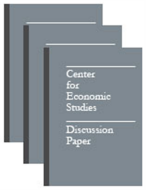The Micro-Dynamics of Skill Mix Changes in a Dual Labor Market: The Spanish Manufacturing Experience
The Micro-Dynamics of Skill Mix Changes in a Dual Labor Market: The Spanish Manufacturing Experience
Working Paper Number: CES-09-12
Abstract
As in many other developed countries, the share of skilled workers in Spain’s labor force dramatically increased during the 1990s. This paper decomposes the aggregate skill mix change by a set of key firm characteristics and in the context of Spain’s dual labor market. We find that continuing firms were the major drivers of skill mix growth and that expanding firms in particular increased their ratio of skilled workers. Net entry played a smaller but positive role due to higher-skilled entrants and lower-skilled exiters. Finally, we find that although firms with higher concentrations of temporary workers make bigger employment changes overall, firms’ low-skilled employment is more strongly pro-cyclical than is high skilled employment.
Page Last Revised - October 8, 2021




